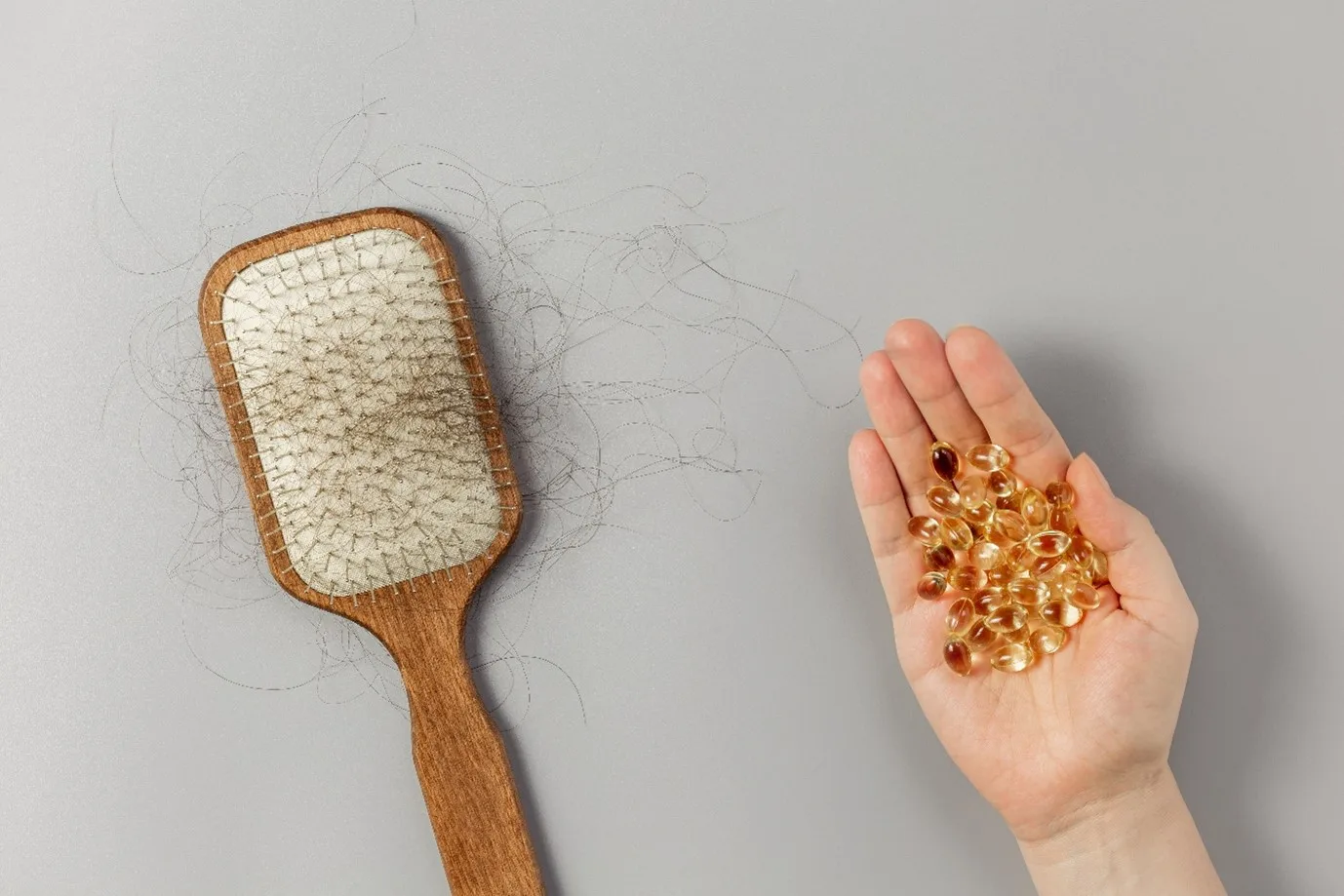Have you ever wondered which vitamin deficiency causes dandruff?

We’ve all heard how important vitamins and minerals are for a healthy body. You might have even tried a few vitamin supplements or multi-vitamin packs, most likely to balance out a poor diet. But why is there so much concern about deficiencies?
Vitamins are organic compounds that provide the nutrients required by your body. They are found in food or even trace amounts within you. Vitamin D for example is synthesized by your body when exposed to sunlight. Vitamins are mainly water-soluble, which pass through your system, or fat-soluble which can be stored in the body.
What are the common vitamin deficiencies?
Which vitamin deficiency causes dandruff?
How to reduce dandruff with vitamins?
The issue with vitamins is that too much or too little of it can lead to a whole range of problems. Before we see which deficiency causes dandruff or any hair ailments, we might want to look at some of the effects of vitamin and mineral deficiencies:
- Brittle hair and nails
- Bleeding gums
- Mouth ulcers and cracks
- Hair loss
- Restless leg syndrome (a nervous system disorder)
- Flaky scalp
- Fatigue or weakness
- Bruising
- Constipation and poor digestion
- Poor appetite and weight loss.
What are the common vitamin deficiencies?
Vitamin A
This is a fat-soluble vitamin that is necessary for your vision. You might remember hearing how carrots can make your eyesight better, that’s because of the density of vitamin A in carrots.
Vitamin A deficiency can lead to dry skin, dry eyes, impaired vision, aggravated eczema, and even delayed growth in children. It is important in the fight against inflammation and promotes skin development, which is probably why people talk about vitamin A for dandruff.
Foods that you can eat for vitamin A are cheese, eggs, oily fish, milk, yogurt, kale, broccoli, spinach and seeds.
Vitamin B
This is a large grouping of vitamins, with each having a role to play. These are water-soluble vitamins that are essential to the system. Vitamin B1 and B2 help with blood sugar, metabolising food and are essential for growth. B12 is essential for your nervous system. B7 is known as biotin and helps the body metabolise fats, proteins and carbs.
The most common deficiency is vitamin B12 which can throw your circulatory and nervous system into disarray. Vitamin B deficiency can lead to chronic fatigue, weakness, memory trouble, weight loss, brittle hair, hair loss, ulcers, etc.
There are various food groups that you can consume to manage your vitamin B deficiency. Meat, grains, fruits, and vegetables, all contain forms of vitamin B. Additionally, meat, eggs and dairy are good sources of B12. In general, it is important to have a balanced diet to counter any vitamin B deficiency.
Vitamin C
This water-soluble vitamin plays a role in wound healing and infection control. It is required by the body to make collagen, which is a fibrous protein found all across the body.
Vitamin C deficiency can weaken the immune system and cause chronic inflammation. It can cause bumps on your skin, slow down healing of wounds, joint pain, dry skin, weaker bones, gum bleeding, fatigue, etc.
The largest source of vitamin C is citrus fruits like orange, kiwi, and lemon. You can also find it in bell peppers, broccoli, strawberries, tomatoes, potatoes, etc.
Vitamin D
Along with vitamin B12, this is the most common deficiency seen amongst the populace. Vitamin D is usually synthesized by the body when exposed to sunlight. But we spend so much time indoors that we often receive only harmful sunlight exposure.
Vitamin D is important for stronger bones, improved immune system, calcium absorption, blood sugar levels, etc. Thus, the vitamin D deficiency can cause quite a bit of trouble, wreaking havoc on bone density, cardiovascular health, fatigue, and can even lead to multiple sclerosis. It is even associated with increased depression and stress.
Getting enough morning sunlight can help your skin produce this vitamin naturally. Or eat foods like tuna, salmon, cod liver oil, egg yolk, red meat, and fortified foods.
Which vitamin deficiency causes dandruff?
The simple answer is that no vitamin deficiency can be the reason for dandruff. But it can aggravate the situation and make it harder to deal with. Dandruff occurs when a fungus known as Malassezia Globosa starts feeding on any excess oil found on your scalp. This naturally occurring fungus can break down the oil into fatty acids that almost 1 in 2 people are sensitive towards. It leads to redness, itching and flaking on the scalp.
A vitamin deficiency of certain vitamins can make this situation much worse. Vitamins D, B2, B3, B6, B7 are usually associated with a flaky scalp. A deficiency of these vitamins can directly impact the immune system and increase the risk of inflammation. Vitamin B and Zinc also play an integral role in boosting your immune system to counter dandruff like ailments.
How to reduce dandruff with vitamins?
Eat healthy. When trying to use vitamins for dandruff, incorporate the following foods into your diet:
- Omega 3 fatty acids
- Whole grains
- Fish
- Meat
- Dairy
- Nuts
- Eggs
- Green vegetables
- Seeds
- Nuts
- Vitamin supplements
Beyond that, you can also search for essential oils which use vitamin E for dandruff. You can create hair masks, as it is known for healing and anti-inflammatory properties. Consuming vitamin E can also boost blood circulation through the body, which takes nutrients to the scalp.
Balancing your vitamin intake is an effective dandruff treatment, but you also need a shampoo for dandruff. You need something that can clean the scalp and get rid of the dandruff causing microbes, like the Head and Shoulders Neem. It is clinically proven to leave you with up to 100% dandruff free hair, removing any visible flakes with regular use.



